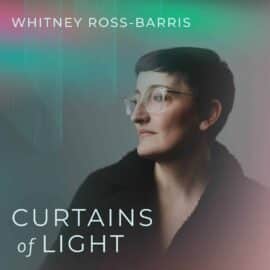| Jazz |

There are albums that announce their originality from the very first bars, and Curtains of Light is one of them, a work that radiates the unmistakable glow of 1970s and ’80s studio craftsmanship, while slipping effortlessly between jazz, soul, pop, and several other borderless musical worlds. At its center stands a vocalist who asserts her artistic identity not with force, but with a kind of benevolent confidence. In an era when so many productions feel engineered toward predictability, pre-calibrated for algorithms, boxed in by genre categories or marketing strategies, this record does something increasingly rare: it breathes. Whitney Ross-Barris moves through it like a free electron, shaped as much by joy as by instinct, unleashing ideas with the good humor of an artist finally granting herself full creative license.
Yet beneath that freedom lies something deeper. Curtains of Light crystallizes intensely human stories of disconnection, nostalgia, and the quiet resilience that emerges from difficult years. What lingers is not only the music itself, but the sense of a life unfolding behind it, the residue of days lived intensely, imperfectly, and with a particular tenderness. And woven throughout the album are field recordings captured from Ross-Barris’s daily life: a door closing, a child laughing in the next room, the faint resonance of a street corner or a breath caught between two thoughts. These sounds do not simply decorate the music; they expand it. They anchor the songs in a world both intimate and universal, blurring the line between autobiography and atmosphere. They give the listener the uncanny sensation of stepping momentarily into someone else’s memory.
Powered by irresistible grooves and widescreen, almost cinematic arrangements crafted by award-winning multi-instrumentalists Michael Shand and Drew Jurecka, Curtains of Light offers a rich and varied sonic palette from beginning to end. And there is no need to consult her résumé to understand that Ross-Barris is also an accomplished actor: the theatrical sensibility is embedded in how she shapes each phrase. She leans into themes with unapologetic delight, yet her voice imposes a second, deeper reading on the material, a sense that these songs are reflections as much as performances. Every artistic intention, carefully weighed, functions not as a flourish but as an invitation: listen, think, return.
For more than 27 years, the Toronto-born Ross-Barris has made a life on stage, moving between Canada and the United States, known for performances that lead audiences from laughter to tears. Curtains of Light carries with it a story born during the pandemic, when she, confined with three young children and an uncooperative cat, sustained her spirit by composing at her 117-year-old piano. Here again, the sensory dimension is essential: you can almost hear the age of the instrument, its wood exhaling softly as its keys respond. With support from the Ontario Arts Council and her loyal listeners, she transformed those suspended moments into a collection of original compositions, an album that holds the imprint of a global pause and the personal reawakening that followed.
It may surprise some that, years after the height of the pandemic, so many albums born of that period continue to emerge. But for artists, composers, singers, writers, musicians—the crisis was not merely a disruption; it was a crucible. For many, those months yielded introspection, invention, and a renewed sense of purpose. The result is work like this: light on the surface, yet profound, tender, and full of hope. Work that understands that creativity often emerges from the smallest details: a child’s footsteps in a hallway, the hum of a kitchen appliance, a phrase whispered to oneself in the late afternoon. These scraps of lived experience form the invisible scaffolding of Curtains of Light.
As JazzFM91’s John Devenish observed, “There is nothing but merit in proudly proclaiming respect for the roots of an art, respect for a sound, a style, and the craft itself. Add to that a list of influences as iconic as Chet Baker, Tom Waits, Louis Armstrong, Anita O’Day, Mel Tormé, Marvin Gaye, and Oscar Peterson; then fold in a theatrical dimension and you encounter the original, vibrant artistry of Whitney Ross-Barris.”
I only discovered this statement after drafting my review, and it confirmed precisely what I had sensed while listening. If you have not yet encountered this singular artist, let this album be your introduction. Authentic and unmistakably her own, Whitney Ross-Barris offers something rare: a creative proposition that stands outside the ordinary, one in which sound, memory, and emotion intertwine with unusual clarity. And perhaps that is why falling for this album feels so natural: Curtains of Light does not ask to be understood. It simply asks to be inhabited.
Thierry De Clemensat
Member at Jazz Journalists Association
USA correspondent for Paris-Move and ABS magazine
Editor in chief – Bayou Blue Radio, Bayou Blue News
PARIS-MOVE, November 15th 2025
Follow PARIS-MOVE on X
::::::::::::::::::::::::
FRIDAY, NOVEMBER 21ST, 2025 @ 8PM: The Arts and Letters Club of Toronto, 14 Elm St. Toronto
Track Listing:
Bourgeois Reverie
Up In The Night
Bird Of Paradise
Sentrees
Stranger
Park Life
Sunrise
There You Are
Just Waiting To Be Asked
If I Were You
Only At Night
Midwinter Blue
Curtains Of Light

